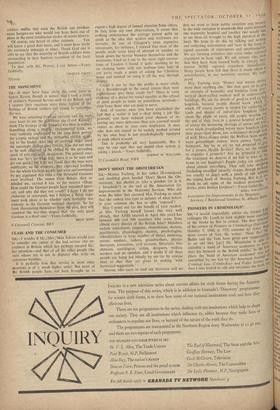CLASS AND THE CONSUMER
Sin,—I wonder if Mr./Mrs./Miss Adrian would care to consider- one aspect of the bad service one en- counters in Britain which has perhaps escaped his/ her attention—and that of all the other people (the ones whose sex is not in dispute) who write on consumer troubles. It is perfectly true that Service in most other • countries is of a much higher order. But most of the British people have not been brought up to expect a high degree of formal attention from others. In fact, from my own observations, it seems that nothing embarrasses the average person quite so much as the idea that waiters and waitresses are servants. At one of Glasgow's most expensive restaurants, for instance, I noticed that most of the people made some kind of attempt or another to break down the barrier between themselves and the waitresses. Used as I am to the more rigid conven- tions of London I found it quite startling to be on chatting terms with our waitress (one lady ilf our party made a point of asking her Christian name and insisted on using it all the way through cl inner). Cduld it not be that the public is more ready for a breakthrough in the social system than most sophisticates give them credit for? There is some esiidence of a desire for social equality in the refusal of most people to insist on punctilious servitude— even from those who arc paid to serve.
And, of course, once you have established the fact that a waiter is just a chap doing a job like thurself, you have reduced your chances of re- ceiving any more deference than you yourself would expect to show to your own employers. A man who does not expect to be unduly pushed around by his own boss is not psychologically equipped to push others around.
This is probably all very lamentable. But it may be one sign that our stupid class system is taking a knock.—Yours faithfully, 23 Cavendish Road, NW6 GORDON M. WILLIAMS






































 Previous page
Previous page